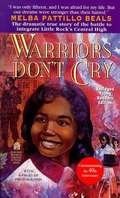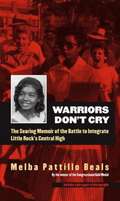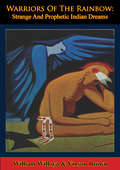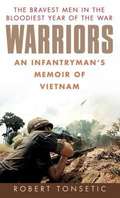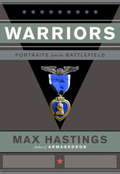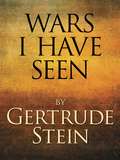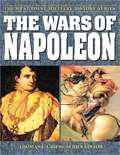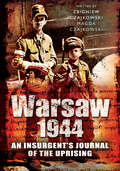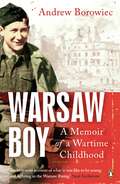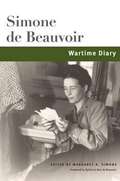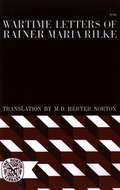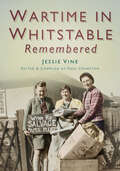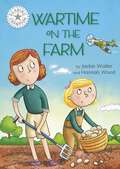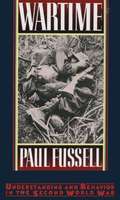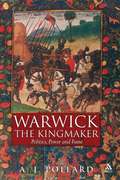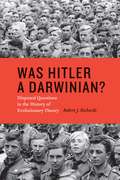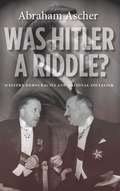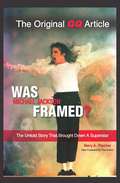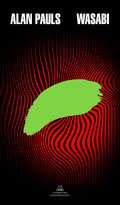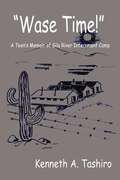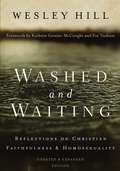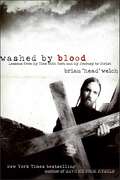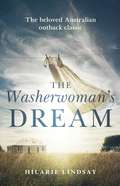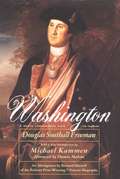- Table View
- List View
Warriors Don't Cry: A Searing Memoir of the Battle to Integrate Little Rock's Central High (Abridged Young Readers Edition)
by Melba Pattillo BealsOriginally published more than a decade ago, this searing account of the 1957 integration of Central High School in Little Rock--an ALA Nonfiction Book of the Year--is written by one of the black teenagers chosen to become warriors on the front lines of the Civil Rights Movement.
Warriors Don't Cry: The Searing Memoir of the Battle to Integrate Little Rock's Central High (Abridged Edition)
by Melba Pattillo BealsAn innocent teenager. An unexpected hero. In 1957, Melba Pattillo turned sixteen. That was also the year she became a warrior on the front lines of a civil rights firestorm. Following the landmark 1954 Supreme Court ruling, Brown v. Board of Education, Melba was one of nine teenagers chosen to integrate Little Rock's Central High School. Throughout her harrowing ordeal, Melba was taunted by her schoolmates and their parents, threatened by a lynch mob's rope, attacked with lighted sticks of dynamite, and injured by acid sprayed in her eyes. But through it all, she acted with dignity and courage, and refused to back down. This is her remarkable story.
Warriors Of The Rainbow: Strange And Prophetic Indian Dreams
by William Willoya Vinson BrownStrange & Prophetic Dreams of the Indian People. This is a touching story of a great grandmother instilling the Indian spirit in her great grandson. It gives guidelines for a glorious future: 'We have had enough now of talk. Let there be deeds.'In the words that follow we have written simply and wholly what we believe, believing that only God is the Knower. That men should love one another and understand one another is the great message of the visions of the Indian peoples told about in this book, nothing of selfishness nor vanity, nothing of narrowness nor pride. We write what we feel deep in our hearts, and the bulk of the book is the expression of this feeling. On the other hand, we wish to write about only what is reasonable and intelligent, so, in the appendix at the back of this book, we give what we consider reasonable and intelligent answers to why the study of prophetic dreams has value, how they fit patterns, and how it may be possible to understand them.
Warriors: An Infantryman’s Memoir of Vietnam
by Robert TonseticOn the ground, in the air, and behind the lines, grunts made life-and-death decisions every day—and endured the worst stress of their young lives. It was the tumultuous year 1968, and Robert Tonsetic was Rifle Company commander of the 4th Battalion, 12th Infantry in Vietnam. He took over a group of grunts demoralized by defeat but determined to get even. Through the legendary Tet and May Offensives, he led, trained, and risked his life with these brave men, and this is the thrilling, brutal, and honest story of his tour of duty. Tonsetic tells of leading a seriously undermanned ready-reaction force into a fierce, three-day battle with a ruthless enemy battalion; conducting surreal night airmobile assaults and treks through fetid, pitch-black jungles; and relieving combat stress by fishing with hand grenades and taking secret joyrides in Hueys. During that fateful year, as unrest erupted at home and politicians groped for a way out of the war, Tonsetic and his men did their job as soldiers and earned the title “Warriors.”
Warriors: Portraits from the Battlefield
by Max HastingsHeroism in battle has been celebrated throughout history, yet it is one of the least understood virtues. What makes some men and women perform extraordinary deeds on the battlefield? What makes them risk their lives in the pursuit of victory? Max Hastings, one of our foremost military historians, has seen combat up close and written about it for decades. In Warriors, he brings us the experiences of fourteen soldiers who fought in the wars of the nineteenth and twentieth centuries. From an exuberant cavalry officer in Napoleon's army to an abused orphan who in World War II became America's youngest general since Custer, to an Israeli officer who recovered from a devastating injury to save his country, each portrait depicts a unique and remarkable story. A tribute to soldierly valor and a deeply insightful study of combat, this is an essential book for anyone who wishes to understand what it means to be at war.
Wars I Have Seen: Gertrude Stein Collection
by Gertrude SteinWars I Have Seen is the American writer Gertrude Stein's memoir of her experiences during the Second World War. Gertrude Stein was living in Europe during the time of the war.
Wars and Rumors of Wars
by Roger Lincoln ShinnReflections on wars by a noted professor of Christian ethics. The book includes an autobiographical fragment describing his captivity by the Germans in 1944-45.
Wars of Napoleon
by Albert Sidney BrittThis fascinating study takes the reader from the early years of Napoleon's career to his defeat at Waterloo. It is a penetrating look at the technology, tactics, logistics, strategy, and outstanding generalship that created an empire.
Warsaw 1944: An Insurgent's Journal of the Uprising
by Zbigniew Czajkowski&“Built around a journal written in the months just after the Warsaw uprising by . . . a teenage fighter in the Polish underground . . . a compelling account.&” —HistoryOfWar.org This remarkable journal, written shortly after the event, describes not only the author&’s own experiences of the 1944 Warsaw Uprising but the wider picture. With the Soviet Army&’s arrival imminent, the Polish Underground fighters decided to wage open warfare against the hated Nazi occupiers. This courageous decision was taken despite the Poles chronic shortage of arms, ammunition, and medical support. They fully expected the Soviets to relieve them gratefully for hastening the defeat of the Germans. With cruel and calculated cynicism, the Soviets halted their offensive and let the uneven match be settled without their involvement. The outcome was inevitable Warsaw was largely destroyed, the Polish men, women, and children fighters crushed and the Nazis weakened. The Soviets then moved in. This journal is a unique record of the bitter fighting when neither side was prepared to give quarter. &“Authentic, dramatically realistic, showing the tragedy of a generation thrown into a hopeless battle. A priceless treasure against which other memoirs pale in comparison.&” —Lech Dzikiewicz &“The author has described the scenes of fighting so vividly almost impossible to believe he had come out unscathed.&” —Kultura &“An exceptionally valuable document—great historical and literary value.&” —Dziennik Polski
Warsaw Boy: A Memoir of a Wartime Childhood
by Andrew BorowiecWarsaw Boy is the remarkable true story of a sixteen-year old boy soldier in war-torn Poland. Poland suffered terribly under the Nazis. By the end of the war six million had been killed: some were innocent civilians - half of them were Jews - but the rest died as a result of a ferocious guerrilla war the Poles had waged. On 1 August 1944 Andrew Borowiec, a fifteen-year-old volunteer in the Resistance, lobbed a grenade through the shattered window of a Warsaw apartment block onto some German soldiers running below. 'I felt I had come of age. I was a soldier and I'd just tried to kill some of our enemies'.The Warsaw Uprising lasted for 63 days: Himmler described it as 'the worst street fighting since Stalingrad'. Yet for the most part the insurgents were poorly equipped local men and teenagers - some of them were even younger than Andrew.Over that summer Andrew faced danger at every moment, both above and below ground as the Poles took to the city's sewers to creep beneath the German lines during lulls in the fierce counterattacks. Wounded in a fire fight the day after his sixteenth birthday and unable to face another visit to the sewers, he was captured as he lay in a makeshift cellar hospital wondering whether he was about to be shot or saved. Here he learned a lesson: there were decent Germans as well as bad. From one of the most harrowing episodes of the Second World War, this is an extraordinary tale of survival and defiance recounted by one of the few remaining veterans of Poland's bravest summer. Andrew Borowiec dedicates this book to all the Warsaw boys, 'especially those who never grew up'.Andrew Borowiec was born at Lodz in Poland in 1928. At fifteen he joined the Home Army, the main Polish resistance during the Second World War, and fought in the ill-fated Warsaw Uprising. After the war he left Poland and attended Columbia University's Graduate School of Journalism. He lives in Cyprus with his English wife Juliet.
Wartime Diary (The Beauvoir Series)
by Simone De Beauvoir Sylvie Le Beauvoir Margaret A. Simons Anne Deing CorderoWritten from September 1939 to January 1941, Simone de Beauvoir’s Wartime Diary gives English readers unabridged access to one of the scandalous texts that threaten to overturn traditional views of Beauvoir’s life and work. Beauvoir’s account of her clandestine affair with Jacques Bost and sexual relationships with various young women challenges the conventional picture of Beauvoir as the devoted companion of Jean-Paul Sartre, just as her account of completing her novel She Came to Stay at a time when Sartre’s philosophy in Being and Nothingness was barely begun calls into question the traditional view of Beauvoir’s novel as merely illustrating Sartre’s philosophy. Most important, the Wartime Diary provides an exciting account of Beauvoir’s philosophical transformation from the prewar solipsism of She Came to Stay to the postwar political engagement of The Second Sex. This edition also features previously unpublished material, including her musings about consciousness and order, recommended reading lists, and notes on labor unions. In providing new insights into Beauvoir’s philosophical development, the Wartime Diary promises to rewrite a crucial chapter of Western philosophy and intellectual history.
Wartime Letters of Rainer Maria Rilke
by Rainer Maria Rilke M. D. Norton<P> The letters Rilke wrote during the war and postwar years are of particular interest not only for whatever they may contain of the wisdom of the poet, the artist, and the humanitarian, but for their analysis of the intellectual and spiritual currents of the time. <P> These letters give the account of Rilke's own state of mind and of his final approach to the threshold of his great works. They show the rapid change he underwent after his reaction to the first excitement of the war; how his dismay at the cruelty and confusion of war helped to render the poet in him speechless for many years; how he nevertheless characteristically held to his own fundamental views throughout war and revolution and in spite of everything retained his belief in the capacity of humanity to create for itself a better future.
Wartime in Whitstable Remembered
by Paul CramptonJessie Vine’s memoir begins in the last few days of peace in 1939. As the Anderson shelter is installed in the back garden of their Rochester home, Jessie, with her young daughter Joy, eagerly awaits her husband Tom’s homecoming, as his ship returns to Chatham Dockyard. And then, when war seems inevitable, Jessie organises an evacuation from Rochester to Whitstable, where she rents a bungalow in the suburb of Tankerton. Tom soon goes back to sea, and the perils of war. They do not see him again for two years. In the meantime, Jessie helps out at a local school, while organising endless collections of salvage. When time allows, mother and daughter cycle all over East Kent to hunt down old film. With these prizes, Jessie compiles a unique photographic diary of life on the home front, which she sends to Tom at sea.
Wartime on the Farm: Independent Reading White 10 (Reading Champion #517)
by Jackie WalterThis story is part of Reading Champion, a series carefully linked to book bands to encourage independent reading skills, developed with Dr Sue Bodman and Glen Franklin of UCL Institute of Education (IOE) Fantastic, original stories are accompanied by engaging artwork and a reading activity. Each book has been carefully graded so that it can be matched to a child's reading ability, encouraging reading for pleasure. Perfect for 7-9-year-olds or those reading book band white.In the middle of the bombing of London in World Two, Ivy and Kitty are sent to live on a farm in Cornwall to keep them safe. How will the sisters settle into their new life?
Wartime: Understanding and Behavior in the Second World War
by Paul FussellIn Wartime, Paul Fussell turns to the Second World War, the conflict in which he himself fought, to weave an intensely personal and wide-ranging narrative.
Warwick the Kingmaker: Politics, Power and Fame
by A. J. PollardWarwick the Kingmaker was a fifteenth-century celebrity; a military hero, self-publicist and populist. For twelve years he was the arbiter of English politics, not hesitating to set up and put down kings. In the dominant strand of recent English historical writing, Warwick is condemned as a man who hindered the development of the modern state; in earlier centuries he was admired as an exemplar of true nobility who defied the centralising tendencies of the crown. A. J. Pollard offers a fresh assessment, to which neither approach is entirely appropriate, of the man whose nickname has become synonymous with power broking.
Was Hitler a Darwinian?: Disputed Questions in the History of Evolutionary Theory
by Robert J. RichardsIn tracing the history of Darwin's accomplishment and the trajectory of evolutionary theory during the late nineteenth and early twentieth centuries, most scholars agree that Darwin introduced blind mechanism into biology, thus banishing moral values from the understanding of nature. According to the standard interpretation, the principle of survival of the fittest has rendered human behavior, including moral behavior, ultimately selfish. Few doubt that Darwinian theory, especially as construed by the master's German disciple, Ernst Haeckel, inspired Hitler and led to Nazi atrocities. In this collection of essays, Robert J. Richards argues that this orthodox view is wrongheaded. A close historical examination reveals that Darwin, in more traditional fashion, constructed nature with a moral spine and provided it with a goal: man as a moral creature. The book takes up many other topics--including the character of Darwin's chief principles of natural selection and divergence, his dispute with Alfred Russel Wallace over man's big brain, the role of language in human development, his relationship to Herbert Spencer, how much his views had in common with Haeckel's, and the general problem of progress in evolution. Moreover, Richards takes a forceful stand on the timely issue of whether Darwin is to blame for Hitler's atrocities. Was Hitler a Darwinian? is intellectual history at its boldest.
Was Hitler a Riddle?: Western Democracies and National Socialism
by Abraham AscherWas Hitler A Riddle?is the first comparative study of how British, French, and American diplomats serving in Germany assessed Hitler and the Nazi movement. These assessments provided the governments in London, Paris, and Washington with ample information about the ruthlessness of the authorities in Germany and of their determination to conquer vast stretches of Europe. Had the British, French, and American leaders acted on this information and taken measures to rein in Hitler, the history of the twentieth century would have been far less bloody: the second world war might well have been avoided, the Soviet Union would not have expanded into central and eastern Europe, and the world would have been spared the Cold War.
Was Michael Jackson Framed?
by Mary A. FischerThis is it! The original GQ story that became an international sensation by exploring, for the first time in the media, the other side-the defense side-- of the 1993 Michael Jackson scandal. Today, it remains a sought-after story by the superstar's fans around the world.Until now, the original, unedited version of the GQ article has not been available. Now, two years after Michael Jackson's death, in the midst of a resurgence of his music and popularity, the official GQ story is being released, with a new cover and foreword written by the author, award-winning journalist Mary A. Fischer.As the media rushed to judgment about the '93 allegations-that Jackson had molested a 13-year-old boy-no one bothered to look in depth at Jackson's adult accusers. GQ senior writer Mary A. Fischer, known for investigating controversial, under-reported stories, took on the assignment.She spent months delving into the backgrounds of Evan Chandler and his attorney Barry K. Rothman, Jackson's main accusers. What emerged from Fischer's examination, based on court documents, business records and scores of interviews, some with confidential sources who would only meet in out of the way places, was a persuasive argument that Jackson molested no one and that he himself may have been the victim of a well-conceived plan to extract money from him.More than that, it was a classic story of greed, ambition, misconceptions on the part of police and prosecutors, a lazy and sensation-seeking media and the use of a powerful, hypnotic drug.Today, it remains an important, relevant story about how a case was simply invented. And now, for the first time in over a decade, it is available to Michael Jackson fans everywhere.
Wasabi
by Alan PaulsCrónica alucinada de cómo un escritor se fabrica un mundo atroz para acceder a la verdad del amor y la literatura. «Un tortuoso viaje hacia el interior de un escritor, una suerte de crucigrama en el que se ponen en juego su vida y sus saberes.»Clarín Apenas desembarcado en Saint-Nazaire, el puerto francés donde pasará dos meses en una residencia de escritores, un novelista argentino descubre que nada es como lo había planeado. No puede escribir. La ciudad, impersonal y vacía, reconstruida por completo después de la guerra, le quita un poco el sueño. El quiste que le ha brotado en la base del cuello no para de crecer. Su mujer se aburre y su editor, dipsómano genial, atormentado, lo mete en toda clase de situaciones equívocas. Obstrucciones y malestar: es todo lo que necesita la vida del escritor, no tan cachorro, para internarse en un laberinto de espejismos lisérgicos, trampas y peripecias delirantes. Abandonado por su mujer, que huye a Londres, y engañado por su editor; el héroe recala en París, que es sólo la máscara glamorosa de una intemperie atroz, y busca redimirse con las únicas pasiones que le quedan: el fanatismo literario y el crimen. Versión tragicómica de un viejo mito de la cultura latinoamericana -el viaje iniciático a Europa-, Wasabi es la crónica alucinada de un escritor que no escribe, distraído por el goce de zozobrar y perderse. La crítica ha dicho... «Una fascinante inmersión en lo inconsciente.»Bella Jozef «Quien aprecie la gran literatura y cultive el placer del texto saldrá regocijado de la lectura de Wasabi.»Moacyr Scliar «El surgimiento de Alan Pauls es lo mejor que podía haberle pasado a la literatura argentina desde la estrella de Manuel Puig.»Ricardo Piglia
Wase Time!: A Teen's Memoir of Gila River Internment Camp
by Kenneth Tashiro"Wase Time!" is an autobiography of my teen age years in Gila River Internment Center, Arizona. I tell my story in the first person and I include much of the humor and conversation that was popular at that time. My story begins with the aftermath of Sunday, December 7, 1941. On Monday, the 8th, I was relieved of my 6th grade job raising the American flag. On March 28, 1942, my family and I moved to Del Rey, California, which was in the "Free Zone." In July, we were told all those of Japanese ancestry would have to leave California. On August 6, we were evacuated to Gila, except for my mom who was 8 months pregnant. Gila was a big center made up of two camps: camp 1 (Canal), and camp 2 (Butte). We lived briefly in Canal, then moved to Butte because of my dad's job. I made friends with my neighbors, and Hank introduced me to many youth who were from the French Camp/Stockton area. I became a member of the Ramblers, a team which played may sports, and we won the championship of the Southwestern Football League in 1943-44. Other happy memories were my mom and sister's arrival from Fresno Assembly Center, movie night, the warehouse gang, the Boy Scouts, and my getting a response to a fan letter that I wrote to Maureen O'Hara. Sad memories include Hank's departure to Tule Lake Relocation Center, my being called a "nigger," and what I did with the letter and photos of Maureen O'Hara. On March 28, 1945, my grandfather and I left Gila to go to Chicago, Illinois, to visit relatives. I was send out of camp for being an unsavory character, according to my mom. On the train ride, I thought of all my experiences in camp. Was being in camp "wase time"?
Washed and Waiting: Reflections on Christian Faithfulness and Homosexuality (Swindoll's New Testament Insights Ser.)
by Wesley HillWesley Hill's personal experiences and biblical reflections offer insight into how a nonpracticing gay Christian can "prove, live out, and celebrate" the grace of Christ and the power of the Holy Spirit.For many who are on this path, it's a lonely one. The reality of loneliness and isolation of the celibate homosexual Christian is something that Hill lives and takes seriously in his pursuit of the gospel-centered life. To those on a similar journey, it's often a life of uncertainties and questions.In Washed and Waiting, Hill explores the three main struggles that have been part of his daily effort to live faithfully:What exactly does the gospel demand of gay and lesbian Christians, and how can it enable them to fulfill its commands?How do Christians who experience homoerotic desires live with the loneliness such desires entail? Is there any relief for it? What comfort does the gospel offer?Can those of us who struggle with homosexuality please God and truly experience his pleasure in the midst of sexual brokenness?Interspersed throughout these main sections are character sketches and stories of people who have experienced this journey's trials and triumphs.Hill offers wise counsel that is biblically faithful, theologically serious, and oriented to the life and practice of the church. As a celibate gay Christian, he gives us a glimpse of what it looks like to wrestle firsthand with God's "No" to same-sex sexual intimacy and contemplate serious and difficult questions.
Washed by Blood: Lessons from My Time with Korn and My Journey to Christ
by Brian WelchAn Out-of-Control Rock Star. An Inescapable Addiction to Drugs. A Miraculous Redemption through Jesus Christ.You think you've heard this story before but you haven't. Washed by Blood is a look at the dramatic saving power of Jesus Christ unlike any other—one that shows how God looks out for all of us, even those who seem farthest away from his grace. Brian "Head" Welch was a rock star who thought he had it all. He was the lead guitarist in Korn, one of the biggest and most controversial rock bands on the planet. He lived in a mansion, had millions of dollars in the bank, and legions of fans all over the globe. He was living the good life, and it should have been perfect. But it was all a lie.What no one knew was that backstage and away from the crowds, Head was fighting a debilitating addiction to methamphetamines, and that nothing—not even the birth of his daughter—could make him quit for good. He had given up. He was empty inside. He spent his days contemplating suicide convinced that each high would be his last. And that was when he found God.Washed by Blood tells the remarkable story of how God's unconditional love freed Head from his addictions and saved him from death. Here Head describes the joys and struggles of his journey to faith, detailing how Jesus has helped him cope with his pain and find the path that's right for both him and his daughter. An account of triumphs, hardships, and the healing power of Jesus, Washed by Blood is an inspirational demonstration that God is always there to save even the most troubled souls.
Washerwoman's Dream
by Hilarie LindsayA beloved Australian outback classic The epic true story of the indomitable Winifred Steger and her extraordinary life in 19th century outback Australia. Winifred Steger travelled to Australia with her father in the 1880s when he took up a land grant in north Queensland. The grant proved to be worthless, and faced with poverty, endless backbreaking work and isolation, Winifred's father spiralled into depression and alcoholism. Left to fend for herself, Winifred battled insurmountable odds to maintain her dignity and sanity, finding solace in writing to ease her hardship. Fleeing an abusive marriage also meant the heartbreak of abandoning her four children – but then miraculously she found love with an Indian trader, Ali. Together with their children, they moved to outback Australia where they ran a camel line. A new phase began in Winifred's life, taking her to places she had only ever dreamed of. The Washerwoman's Dream is the story of a remarkable woman with a tenacious spirit, and is now an enduring Australian classic. Pieced together by Hilarie Lindsay from Winifred’s memoirs, short stories, letters and unpublished novels, this is an account of the amazing life of a forgotten Australian writer. ‘One of the hardest punishments is to be thrown into the world with aspirations and dreams that cannot be fulfilled for want of education . . ’ Winifred Steger
Washington
by Douglas Southall FreemanWinner of the Pulitzer Prize, Freeman's epic seven-volume biography of the founding father is here abridged
